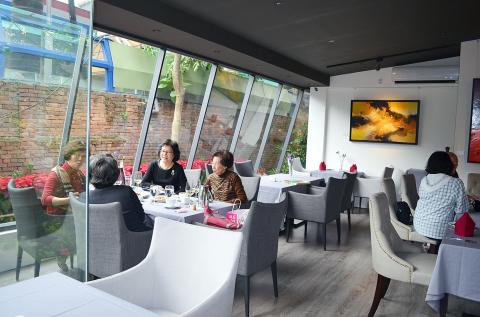In a city with a rich, diverse past like Taipei, serendipity comes in many ways. Tom Chen (陳登壽) owns Jimmy’s Kitchen, a famous Shanghai restaurant with its own history — one that included the original owner fleeing to Taiwan from Shanghai in 1949. But Chen always had another dream.
Chen began work in the service industry at the Grand Hotel, which sent him to Lubeck, Germany to learn bar tending. While there, he became fascinated with the vibrant, raucous atmosphere of salons — places where artists, writers and academics would meet and discuss art and other topics. Chen’s dream was to bring that experience back to Taiwan.
Enter Wolfgang Kroll (1906-1992), a Professor Emeritus in Physics at National Taiwan University (NTU) who grew up in Germany at the height of the Art Deco period. Kroll held the belief that art, literature and science should interrelate.

Photo: Jerome Keating
Kroll may not be a household name with most Taipei residents, but he is well known in the medical and science community because he helped draw international attention to the university, and was responsible for teaching theoretical physics as well as German to generations of physicists and future doctors even after his official retirement.
Kroll, who studied quantum mechanics in Germany under Nobel Prize-winning physicist Werner Heisenberg, emigrated from his home country after Hitler and the Nazi party came to power because one grandparent had Jewish ancestry. With a fascination for Japanese language and culture, Kroll went to Japan in 1937, and then, in 1941, its then-colony Taiwan. One of Kroll’s research papers became the first paper from Taiwan to be published in an international journal.
Until his death in 1992, Kroll lived for half a century in a small Japanese-style house belonging to the university. After his death, the building returned to NTU, which offered it up for development. Still nurturing the dream of a salon, Chen, along with his artist and interior designer-friend Tsai Wen-hsiung (蔡文雄), signed a seven-year lease with the university with an option for renewal. Six months later, the split-level, upscale salon with plenty of natural lighting and artwork, opened to the public as Jimmy’s Garden.
Not strictly a gallery, though art is everywhere, or a restaurant, though you can go there for a meal as well as teatime, Jimmy’s Garden tries to replicate the ambiance of a salon, where he hopes that a new generation of artists, academics and intellectuals will come together over a glass of wine or cup of coffee to discuss and debate current events.
Artists are encouraged to submit an application to display their work at Jimmy’s Garden. Yu Lien-chun’s (余連春) terracotta and metal sculptures are on display until Jan. 31. The salon is open daily from 11am to 9pm and closed on Mondays. 5, Ln 11, Xinsheng S Rd, Sec 3, Taipei City (台北市新生南路三段11巷5號); tel: (02) 2368-1197.

Taiwan has next to no political engagement in Myanmar, either with the ruling military junta nor the dozens of armed groups who’ve in the last five years taken over around two-thirds of the nation’s territory in a sprawling, patchwork civil war. But early last month, the leader of one relatively minor Burmese revolutionary faction, General Nerdah Bomya, who is also an alleged war criminal, made a low key visit to Taipei, where he met with a member of President William Lai’s (賴清德) staff, a retired Taiwanese military official and several academics. “I feel like Taiwan is a good example of

March 2 to March 8 Gunfire rang out along the shore of the frontline island of Lieyu (烈嶼) on a foggy afternoon on March 7, 1987. By the time it was over, about 20 unarmed Vietnamese refugees — men, women, elderly and children — were dead. They were hastily buried, followed by decades of silence. Months later, opposition politicians and journalists tried to uncover what had happened, but conflicting accounts only deepened the confusion. One version suggested that government troops had mistakenly killed their own operatives attempting to return home from Vietnam. The military maintained that the

Before the last section of the round-the-island railway was electrified, one old blue train still chugged back and forth between Pingtung County’s Fangliao (枋寮) and Taitung (台東) stations once a day. It was so slow, was so hot (it had no air conditioning) and covered such a short distance, that the low fare still failed to attract many riders. This relic of the past was finally retired when the South Link Line was fully electrified on Dec. 23, 2020. A wave of nostalgia surrounded the termination of the Ordinary Train service, as these train carriages had been in use for decades

Lori Sepich smoked for years and sometimes skipped taking her blood pressure medicine. But she never thought she’d have a heart attack. The possibility “just wasn’t registering with me,” said the 64-year-old from Memphis, Tennessee, who suffered two of them 13 years apart. She’s far from alone. More than 60 million women in the US live with cardiovascular disease, which includes heart disease as well as stroke, heart failure and atrial fibrillation. And despite the myth that heart attacks mostly strike men, women are vulnerable too. Overall in the US, 1 in 5 women dies of cardiovascular disease each year, 37,000 of them